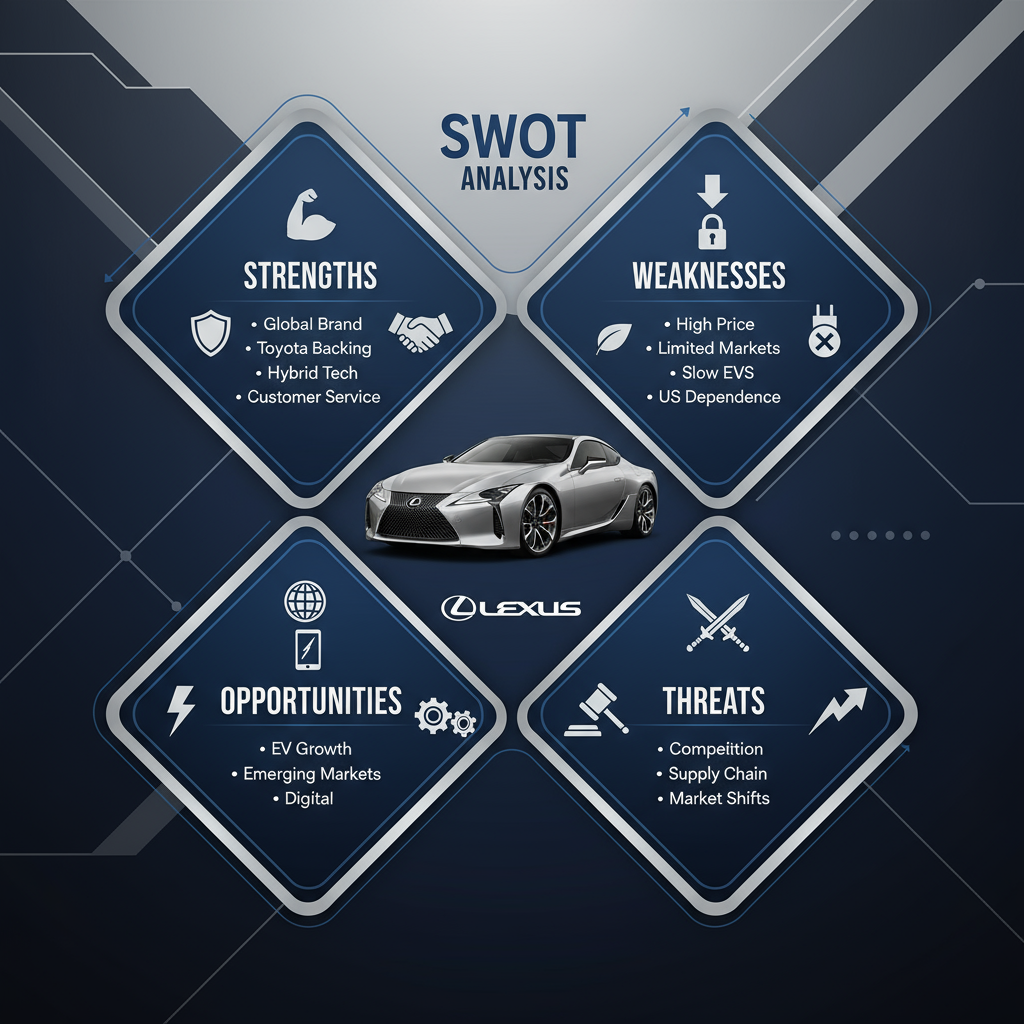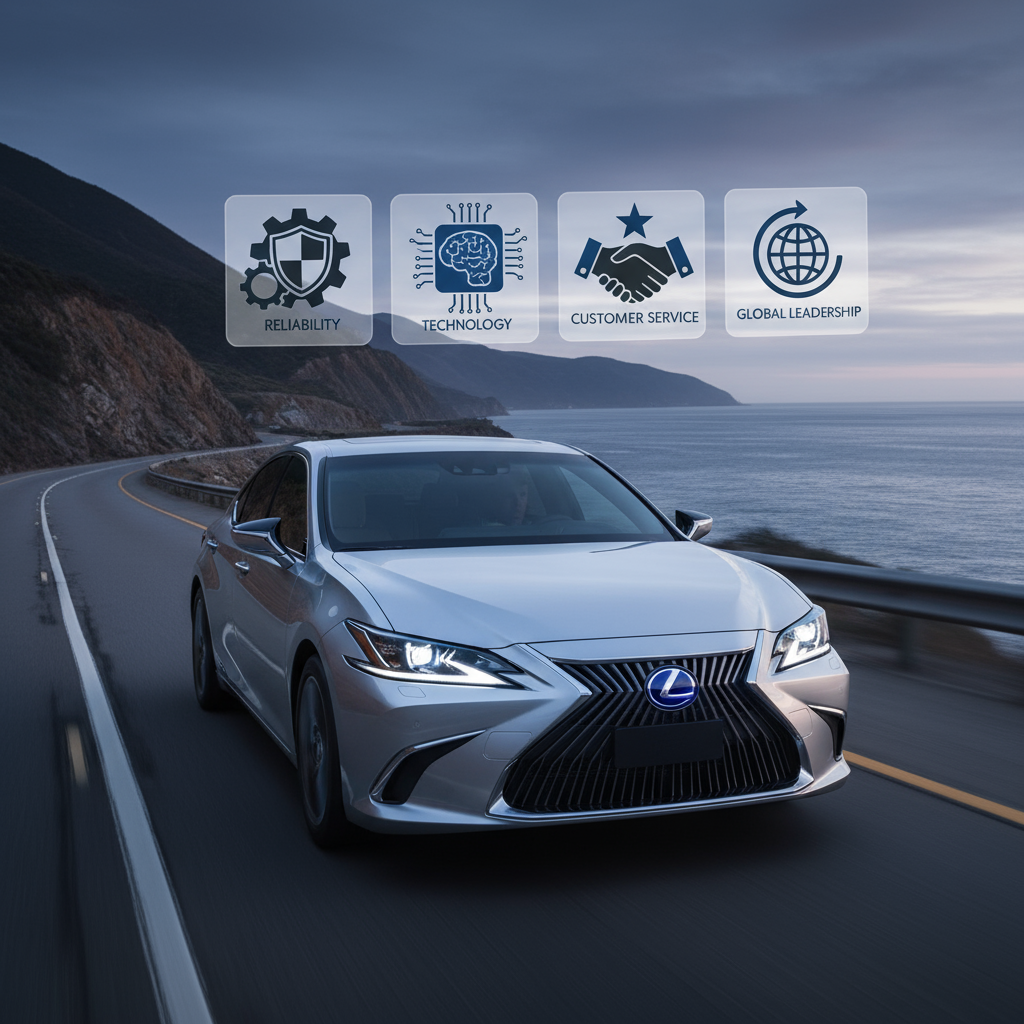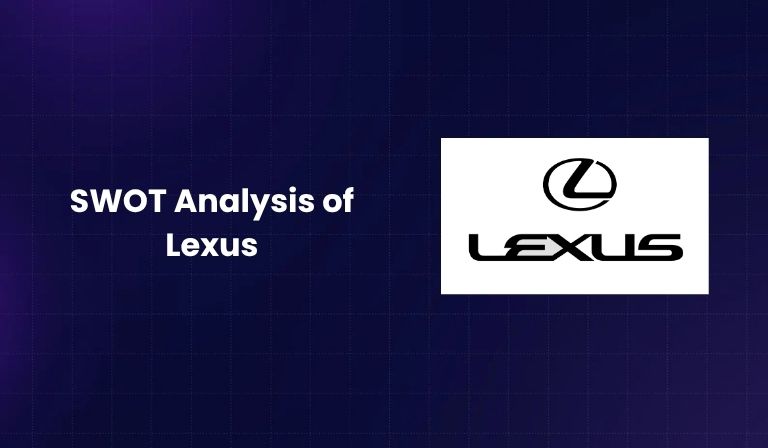Summary
Lexus is the luxury vehicle division of Toyota Motor Corporation. The brand has established itself as a global leader in premium automobiles, offering exceptional quality, innovation, and comfort. This SWOT analysis of Lexus explores the company’s internal strengths and weaknesses, along with the external opportunities and threats it faces in today’s dynamic automotive market. The analysis provides clear insights into Lexus’s business strategy, its competitive position, and how it can sustain growth through innovation and global expansion.
Lexus was launched by Toyota in 1989 with the goal of entering the global luxury automobile market. The brand quickly gained recognition for reliability, comfort, and advanced engineering. Headquartered in Nagoya, Japan, Lexus has become a symbol of luxury and efficiency.
With a presence in over 90 countries, Lexus has earned a loyal customer base by combining Toyota’s manufacturing strength with a premium design approach. The company continues to innovate in hybrid and electric technology, maintaining its competitive edge in the luxury car market.
What Is a SWOT Analysis?

A SWOT analysis is a strategic tool used to identify a company’s internal Strengths and Weaknesses, as well as external Opportunities and Threats. For Lexus, this analysis helps understand its position in the competitive automotive sector and highlights areas for improvement and potential growth.
SWOT Analysis of Lexus (2025)
The following table summarizes the SWOT analysis of Lexus, followed by a detailed explanation of each element.
| Strengths | Weaknesses | Opportunities | Threats |
| Strong global brand image | Limited market in developing regions | Growth of electric vehicle market | Intense competition |
| Backed by Toyota’s expertise | High pricing strategy | Expansion in emerging markets | Supply chain disruptions |
| Advanced hybrid technology | Slow adoption of EVs | Digital transformation | Changing consumer preferences |
| Excellent customer service | Heavy dependence on U.S. market | Strategic partnerships | Economic fluctuations |
| High build quality | Narrow product diversity | Rising demand for hybrid models | Regulatory challenges |
Strengths of Lexus

This section highlights the internal advantages that give Lexus a competitive edge in the automotive industry.
1. Strong Brand Reputation
Lexus enjoys a global reputation for reliability, luxury, and customer satisfaction. It has consistently topped surveys for vehicle dependability and customer service. This reputation attracts premium customers who value long-term performance and trust.
Also Read: SWOT analysis of Range Rover
2. Backed by Toyota’s Engineering Expertise
Lexus benefits from Toyota’s advanced engineering, efficient production methods, and strong financial support. This association helps Lexus maintain high quality while optimizing manufacturing costs.
3. Advanced Hybrid and Electric Technology
Lexus was an early mover in hybrid technology, offering fuel-efficient luxury vehicles. Its models like the Lexus ES Hybrid and RX Hybrid reflect the company’s commitment to sustainability and innovation.
4. Excellent Customer Service
Lexus dealerships provide personalized experiences, premium service, and strong after-sales support. This focus on customer satisfaction helps maintain loyalty and improves brand value.
5. Superior Build Quality and Reliability
The reliability of Lexus vehicles is a major selling point. The brand’s strict quality control ensures fewer defects and longer-lasting vehicles, which strengthens customer trust and resale value.
6. Strong Global Presence
Lexus operates successfully across North America, Europe, and Asia. The United States remains its strongest market, where Lexus consistently ranks as a top luxury brand.
Weaknesses of Lexus

This section outlines internal challenges that limit Lexus’s growth potential.
1. Limited Presence in Developing Countries
Lexus’s sales are concentrated in developed markets. The brand faces challenges in expanding to price-sensitive regions like India and Africa due to import duties and high costs.
2. High Price Range
Lexus vehicles are positioned at the premium end, which limits affordability. This restricts the brand’s reach, especially in markets where luxury spending is lower.
3. Dependence on the U.S. Market
A significant portion of Lexus’s revenue comes from the U.S. market. Over-reliance on one region increases financial risk during economic downturns or changes in market trends.
4. Slow Electric Vehicle (EV) Expansion
While Lexus excels in hybrid technology, it has been slower to adopt fully electric models compared to competitors like Tesla and BMW. This may affect future competitiveness.
5. Limited Product Range in Some Segments
Lexus lacks diversity in certain segments such as compact electric cars and performance variants. Competitors offering wider choices attract a broader audience.
Opportunities for Lexus

This section identifies external factors that Lexus can use to expand its market and improve profitability.
1. Rising Demand for Electric Vehicles
Global awareness about sustainability is increasing demand for EVs. Lexus can expand its electric lineup and strengthen its market position by investing in battery technology and charging infrastructure.
2. Expansion in Emerging Markets
Emerging economies such as India, Indonesia, and Brazil are seeing a rise in luxury spending. Lexus can enter these regions through local assembly units to reduce import costs and offer competitive prices.
3. Digital Transformation
Online car sales and virtual showrooms are growing trends. Lexus can enhance its digital presence with AI-powered customer engagement, online booking systems, and digital service platforms.
4. Strategic Collaborations
Partnerships with technology and battery companies can help Lexus accelerate its EV development. Collaborations reduce costs and speed up innovation cycles.
5. Focus on Sustainability
Consumers are shifting toward eco-friendly brands. Lexus can enhance its image by emphasizing sustainable materials, renewable energy use, and green production practices.
6. Growing Popularity of Hybrid Vehicles
Lexus already leads in hybrid technology. The growing hybrid market offers a chance to expand and dominate this segment before competitors fully adapt.
Threats to Lexus

This section examines external factors that can negatively affect Lexus’s growth and market share.
1. Intense Competition
Lexus faces tough competition from brands like Mercedes-Benz, BMW, Audi, and Tesla. These companies invest heavily in innovation and marketing, creating pricing pressure and reducing market share.
2. Economic Instability
Luxury vehicle sales are sensitive to economic conditions. Recession, inflation, or global crises can reduce demand for premium cars and affect profitability.
3. Supply Chain Disruptions
Shortages in raw materials or semiconductors can delay production. This leads to slower deliveries and increased operational costs.
4. Environmental Regulations
Tight emission standards require heavy investment in clean technology. Non-compliance can lead to penalties and restrictions in certain countries.
5. Shifting Consumer Preferences
Younger consumers are leaning toward electric and connected vehicles. Lexus must innovate quickly to meet these expectations.
6. Currency Fluctuations
Operating globally exposes Lexus to exchange rate volatility. A strong yen can make exports more expensive and affect revenue.
Detailed SWOT Matrix for Lexus (2025)
| Category | Key Points | Strategic Implication |
| Strengths | Brand reputation, Toyota backing, hybrid leadership | Build further on trust and innovation |
| Weaknesses | Limited markets, high pricing, slow EV rollout | Focus on cost optimization and new regions |
| Opportunities | EV growth, digitalization, sustainability | Invest in new technologies and partnerships |
| Threats | Competition, regulation, supply issues | Enhance agility and diversify markets |
Conclusion
The SWOT analysis of Lexus shows that the brand stands strong in terms of quality, technology, and customer satisfaction. Backed by Toyota’s engineering strength, Lexus has built a solid foundation in the luxury automobile industry.
However, challenges such as high pricing, slow EV adaptation, and limited reach in developing countries must be addressed. By expanding its electric lineup, adopting digital strategies, and exploring new markets, Lexus can achieve sustained growth and maintain its position as a leading global luxury brand.
FAQs
What makes Lexus a strong brand?
Lexus is known for its reliability, innovation, and customer service. It offers high-quality vehicles backed by Toyota’s engineering expertise.
What are the weaknesses of Lexus?
The main weaknesses include limited presence in developing markets, high prices, and slower adoption of electric vehicles.
What opportunities does Lexus have in the future?
Lexus can grow by expanding its EV lineup, entering emerging economies, and adopting digital transformation strategies.
What are the biggest threats to Lexus?
Intense competition, economic instability, and supply chain disruptions pose significant threats to Lexus’s business.
How does Toyota help Lexus succeed?
Toyota supports Lexus with advanced engineering, efficient production systems, and a strong research base, helping Lexus maintain superior quality and performance.
A digital marketer with a strong focus on SEO, content creation, and AI tools. Creates helpful, easy-to-understand content that connects with readers and ranks well on search engines. Loves using smart tools to save time, improve content quality, and grow online reach.

